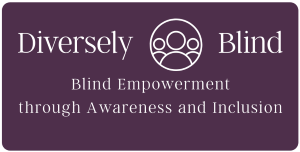Last week, I had a conversation with a colleague whose daughter died by suicide. She shared with me that her daughter died by suicide due to bullying. Her daughter experienced bullying in middle school because she had a disability and it increased her anxiety and affected her mental health. Her daughter was only 11 years old and she was very smart.The parents were working hard to support their daughter by moving her to a different school and bringing her to a mental health psychologist. The verbal and cyber bullying that she experienced was more than what she could handle.
Hearing this story made me think about the different types of bullying that students who are blind and visually impaired experience in education settings. Students with disabilities are at a higher risk of experiencing bullying than students without disabilities. Students who are blind and visually impaired are a group at particularly high risk. Bullying can happen in different ways, including verbally and physically, but social-relational bullying is a type of bullying students who are blind and visually impaired that is under-discussed. Social-relational bullying is when the bully intentionally excludes, isolates, and mistreats students who are blind and visually impaired by exhibiting different behaviors. These behaviors include not sitting with them, not talking with them, spreading rumors about them, and making fun of them. In other words, they don’t involve them in social gatherings inside or outside the school. Unfortunately, social-relational bullying is very commonly experienced by students who are blind and visually impaired. In a study by Bear et al. (2015), 81.9% of students who are blind and visually impaired reported social-relational bullying at school.

Social-relational bullying can have a variety of negative impacts on the individuals, both immediate and long-lasting. It can affect their emotional and mental health, e.g. experiencing depression and anxiety. They may feel embarrassed and awkward, and learn to hide their emotions. They may also experience negative feelings toward locations, spaces, or people involved in the bullying. It could also affect their education, as they may feel negatively about school and not be able to focus. They are also less likely to have friends. Some signs that kids who experience bullying could exhibit include self-isolation, reduced motivation, and risky behavior. All of these things could lead to suicidal ideation, particularly if they are left alone and not addressed.
Social-relational bullying often happens outside the classroom or in unstructured activities, such as during physical education class or recess. Teachers and other adults may unintentionally perpetuate bullying by not providing accommodations or support for students who are blind and visually impaired to participate in various activities.
A possible way to prevent bullying is to always model inclusive behavior by interacting with all students equally despite their disability or race, etc., indirectly teaching students to be intentional and thoughtful of others. It can be useful to take any opportunity to talk about different types of bullying and how it could impact individuals explicitly in different activities. Hopefully, with awareness of the issue, we can recognize the signs of social-relational bullying in students who are blind and visually impaired, and intervene to prevent the long-term negative effects and tragedies that bullying can cause.
References:
Ball, L., Lieberman, L., Haibach-Beach, P., Perreault, M., & Tirone, K. (2022). Bullying in physical education of children and youth with visual impairments: A systematic review. British Journal of Visual Impairment, 40(3), 513-529.
Bear, G., Mantz, L.S., Glutting, J.J., Yang, C., & Boyer, D.E. (2015) .Differences in Bullying Victimization Between Students With and Without Disabilities, School Psychology Review, 44(1), 98-116.
Haegele, J.A., Zhu, X., & Holland, S.K. (2019). School-based bullying experiences as reflected by adults with visual impairments. Psychology in the Schools, 57(2), 296-309.
